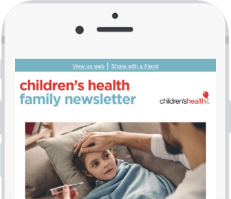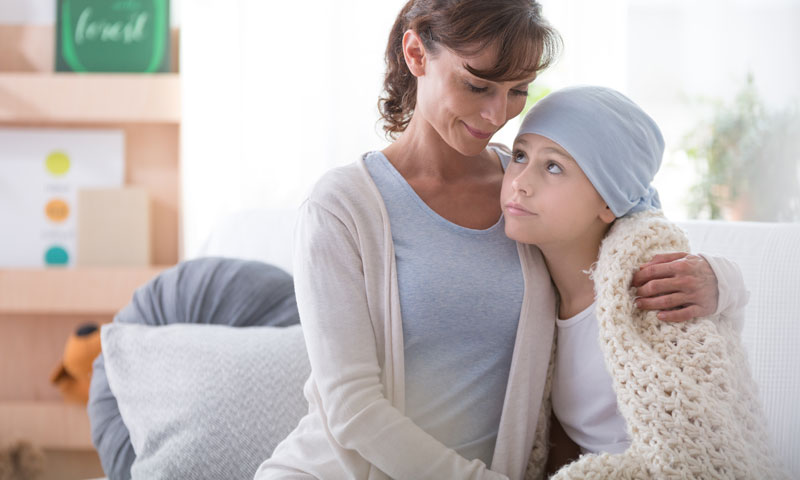Having a child who is facing a cancer diagnosis can be a terrifying experience. It's tempting to hide the diagnosis to protect your kid from the fear that you are experiencing. However, children will hear the term "cancer" used by various members of their medical team during their treatment.
Kids can be fearful of things they do not understand, so although it may seem counterintuitive, being honest and discussing what cancer is and what their diagnosis means can help them feel less anxious.
Alice Ann Holland, Ph.D., ABPP, a board-certified Clinical Neuropsychologist and the Research Director of the Neuropsychology Service at Children's Health℠ shares advice on what to say to a child facing cancer.
How to tell your child that they have cancer and explain what that means
When talking with your child about their cancer diagnosis, first use general terms, giving the big picture. Then explain the specific terms that they'll be hearing frequently, like "chemo" and "side effects," and let them know they can ask about other words they don't understand.
"Instead of having one conversation, it often is best to break up topics into smaller conversations," says Dr. Holland. "This may help your child feel less overwhelmed."
What to say to toddlers and preschoolers
At this age, children may not require many details beyond understanding the big picture. Focus on
- What their treatment will involve
- Explaining common terms they'll hear during treatment
- Answering their questions, as they arise
- Always being as honest as possible
Child Life team members can help by explaining and demonstrating scary procedures such as port access.
What to say to school-aged children
School-aged children may have more knowledge of what cancer is, but an incomplete understanding can lead to more fear. They may worry that they did something wrong that caused them to get cancer or that their cancer might be contagious. Some kids may have heard of people dying of cancer and believe that they soon will die too. In addressing their fear, it's important to make sure your child knows that there are different kinds of cancers, and everyone's cancer is different.
What to say to teenagers
Teenagers typically have more knowledge about cancer, but this does not mean that they are immune to misconceptions and fear. They may want more details about their survival odds and potential side effects. Feeling different from their peers can be difficult. It's important to prepare them for any challenges that may make them feel different, such as hair loss or frequent school absences.
To promote stronger feelings of social support, encourage teens to talk with select friends about their diagnosis. Teens may be concerned about potential long-term side effects such as stunted growth or fertility issues. It's important to provide education on all these topics. Ask them if they would prefer to talk with you or with a member of their medical team.
What is the best way to explain cancer to a child?
Explaining cancer to toddlers and preschoolers
For preschool-aged children, you can talk about cancer being an illness that causes a "lump" (if there is a tumor) or "bad cells" in the blood (for cancers such as leukemia) that need to be removed.
Chemo infusions might be described as sending "soldiers" into their body to "fight" the "bad cells." It is important to normalize feelings of being scared. Reading books designed to explain cancer to young children, such as Amazing Annabelle by Dyan Fox, also may be effective.
Explaining cancer to school-aged children
Many school-aged kids dislike feeling as though adults are treating them like children, so conversations at this age may need to include more medical terms. Analogies about cells doing "battle" may be helpful for some children in this age range, but they might also appreciate specific information about their treatment.
Be prepared to discuss tough topics such as death, which children may or may not have direct experience with at a young age. As children reach adolescence, explanations of medical terms may be accompanied by reading materials from the medical team.
Explaining cancer to teenagers
Teens will not only rely on the information you provide but also may search for information about cancer on the internet. Periodically asking if they have questions may give them an opportunity to raise concerns that they may be keeping to themselves after gaining information from other sources.
What behaviors are likely from children facing cancer?
Behaviors to expect from toddlers and preschoolers facing cancer
Preschool-aged children may struggle with the day-to-day experiences of cancer treatment. "It is anxiety-provoking and generally distressing for a young child to undergo countless medical procedures and lengthy hospitalizations that are not only beyond their control but also beyond their understanding," says Dr. Holland.
In response, preschool-aged children often cope with their anxiety through oppositional efforts to exert control over their environment. Seeking greater control over various situations (e.g., refusing to eat certain foods, not wanting to share toys, resisting change) may represent attempts to feel as though the world is not as unpredictable and uncontrollable as they fear.
Behaviors to expect from school-aged children facing cancer
School-aged children facing a cancer diagnosis may feel uncomfortably different from their peers and anxious about the stability and security of their world.
Additionally, it is not uncommon for young children to report physical complaints (e.g., stomachaches, headaches) as an expression of anxiety, especially since they often do not have the vocabulary to explain their feelings in words.
Behaviors to expect from teenagers facing cancer
Teens often are reluctant to acknowledge feeling scared or upset about their cancer diagnosis and may try to hide their own fears out of concern for upsetting or stressing their parents.
Talk to them about how normal it is to feel scared and even angry, as such conversations may help them feel that they have permission to express their fears and other negative emotions.
Children and adolescents who do not feel comfortable discussing and processing their feelings with a parent or other trusted adult (e.g., therapist) may struggle with increased irritability and anger outbursts due to the emotional burden of internalizing and hiding their negative feelings.
What are common fears that children may have as they face cancer?
Many children struggle with fears of specific medical procedures involved in cancer treatment, especially port access. On a larger scale, some children may worry that they did something to cause their cancer, or that their cancer might be contagious to others.
Some kids may fear dying from cancer. Many children and adolescents worry about burdening their parents with their own fears, which can lead to maladaptive internalization of those negative emotions.
If returning to school with an altered appearance (e.g., hair loss or weight loss), children and adolescents may fear being teased by others. Even after their cancer experience, many children and adolescents experience lingering anxiety about their health, including fears of their cancer returning and an increased awareness of the possibility of death that can lead to excessive anxiety about other life activities (e.g., riding in cars).
How can parents help their child cope with cancer?
The most important thing parents can do to help their child cope with a cancer diagnosis is to normalize negative feelings (e.g., anxiety, anger, sadness) while also modeling courage and bravery.
"Parents should also keep in mind the airplane analogy: Put on your own oxygen mask before helping your child," says Dr. Holland. In other words, parents should attend to their own physical and emotional health in order to provide the best support to their child. Accept support from others offering help and don't hesitate to ask for help from family and friends.
Parents may find it helpful to join support groups (in person or online) or even participate in individual therapy or counseling. Many hospitals also have pastoral care providers for parents who desire religious or spiritual support during their child's treatment.
Both during and after cancer treatment, many children may benefit from similar services, including peer support groups and individual therapy or counseling (or play therapy for younger children who may not be able to express their feelings in words).
Many hospitals also have child life specialists, music therapists, therapy dogs and other services that can help children feel more comfortable and happier while at the hospital. Parents should inquire about such services and advocate for their child to get any services that may be helpful to their child.
Parents can look for opportunities to schedule hospital or home visits from family and friends. Helping your child stay connected to their peers during the cancer treatment process – whether through in-person visits, video chats or simply texting – can strengthen feelings of social support and help a child cope with the isolation of lengthy hospitalizations.
Learn more about cancer treatment at Children's Health
Learn more about the Pauline Allen Gill Center for Cancer and Blood Disorders at Children's Health and how our highly trained experts help children fight cancer.

Thank you!
You are now subscribed to the Children's Health Family Newsletter.
Children's Health will not sell, share or rent your information to third parties. Please read our privacy policy.
